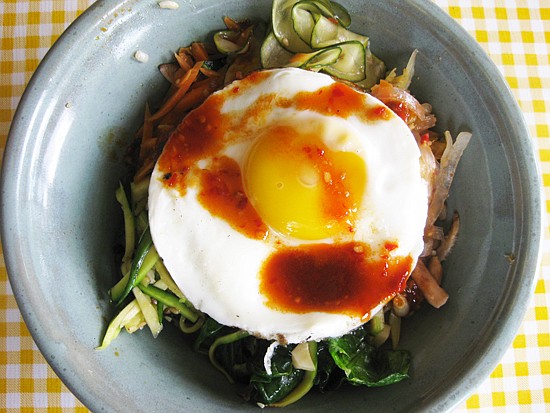Pecking Out the Benefits of Eggs
April 13, 2015 at 12:07 p.m.
Farm fresh eggs are a delightful way to start the day! Happy chickens that are pasture raised have been shown to produce healthier eggs. With the freedom to roam, pasture-raised hens are able to participate in their natural behaviors such as hunting and pecking bugs and worms as well as eating alfalfa and clover, all of which improve the nutritional content of the eggs they produce.
The question for many people still remains, are eggs safe to eat and aren’t they filled with cholesterol? The 2015 Dietary Guideline Recommendations suggest that eggs can be consumed as part of a healthy diet. Yes, it’s true that eggs have high amounts of dietary cholesterol; however, research indicates that the amount of cholesterol absorbed from foods, such as eggs, is lower than previously believed. Thus, although eggs contain cholesterol, only a small portion remains in the body.
The shelves at the grocery store are filled with several choices of eggs these days, so here is a quick summary of what some of the labels mean.
Cage Free and Free Range – As the name implies, hens are allowed to roam free. They typically do not have access to the outdoors and likely have their beaks cut. Some facilities are third=party certified, meaning they are kept to a particular standard. These terms are not regulated.
Pasture Raised – Hens are typically kept outside most of the year with free-roaming abilities. This term is not mandated or regulated although producers can be third-party certified. There aren’t any regulations on what food is fed to the hens.
Certified Organic – Hens are uncaged and must have some access to outdoors; the amount of time outdoors is not defined. Feed must be 100 percent organic and vegetarian. No antibiotics are allowed at any time.
Hormone Free – This is almost like a trick question. Hormones are never given to any hens, thus, whether labeled or not, all eggs are hormone free.
Omega-3 – The hens have had their food enriched with omega-3 fatty acids, making the eggs higher in omega-3 fatty acids.
Eggs are a good source of protein and several B vitamins including B12; they also contain choline and selenium, all of which are necessary components of a healthy diet. Although eggs have given been the green light to be added as part of a healthy diet, if you have heart disease, you should talk with your doctor before making any drastic changes.
There is some evidence that eggs that come from pasture-raised hens contain more omega-3 fatty acids (naturally) and have greater amounts of vitamins D and E. So the next time you are trying to decide what to make for breakfast (or dinner), consider including eggs in your meal.
April brings opportunities for brunches with family and friends and a quiche can be a great way to provide a healthy dish that includes eggs. Another simpler idea is to try making the recipe below; it includes fresh spring greens, whole grains and probiotics for a balanced, nutritious meal.
Be Bop Breakfast
Use kale, Swiss chard or your favorite greens in this powerhouse breakfast that includes B vitamins and nutrients from eggs and whole grains. Adding kim chee or sauerkraut introduces probiotics to support a healthy gut.
2-3 tablespoons butter, divided
2-3 scallions, chopped
2 cups cooked brown rice
4-5 kale leaves, cut into ribbons
2 eggs
Condiments:
Tamari
Apple cider vinegar
Kim chee or sauerkraut
Thai chili sauce
Heat a large cast iron or other nonstick skillet. Put about 2 teaspoons of butter in and add scallions. When they are bright green, add the cooked rice. Stir it around until thoroughly heated. Divide rice into 2 large bowls; sprinkle with a little tamari if desired.
Put 2 more teaspoons of butter in the skillet. Add kale and toss until the kale is starting to wilt and glistening. Put 2 tablespoons of water on the kale and cover until water is gone and kale is tender. Divide kale into the bowls with the rice; sprinkle with a little vinegar if desired. Add remaining butter to skillet and heat until it sizzles; break eggs into skillet. When whites are no longer transparent, flip each egg. Cook to desired doneness.
Put one egg into each bowl. Add a tablespoon or two of kim chee or sauerkraut. Dress all with a tiny trail of Thai chili sauce.
Preparation time: 12-15 minutes
Makes 2 servings
Reprinted with permission from “Feeding the Young Athlete Family,” by Cynthia Lair (Readers to Eaters, 2012).
Non-profit, accredited Bastyr University (bastyr.edu) offers multiple degrees in the natural health sciences, and clinical training at Bastyr Center for Natural Health (bastyrcenter.org), the region’s largest natural medicine clinic.





